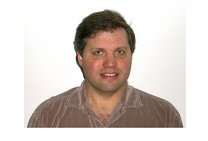Oral history interview with Douglas J. Epstein
- 2008-May-01 – 2008-May-02
Douglas J. Epstein was born in St. John’s, Newfoundland, Canada, where he lived for about five years. At that time his parents divorced, and he and his mother and three older siblings went to live in Montreal, Québec, Canada; his father remained in St. John’s, so the two did not see each other much. Epstein’s best childhood memories are of summers spent at camp, with a week-long canoe trip at one of the nearby national or provincial wildernesses. School he found uninspiring, though he thought his education was relatively good. Because of the Separatist movement 70-80% of his classes in junior high were in French; in high school only about 40%. He did like his high-school science classes, taking as many as he could. He liked the order and logic of science. He spent his CÉGEP (Collège d’enseignement général et professionnel) year fascinated by tapeworms and the logic of their design.
Because his friends were all going to McGill University, Epstein thought he would go there too. Accepted into the arts division, he decided to matriculate instead at Concordia University, which had a good science program. There he discovered genetics. He believes that the small classes and the access he had to good teachers at Concordia were very beneficial to him, allowing him to transfer to McGill after a year. There he did very well and received an excellent education. He had expected to go to medical school, but spending several summers as an orderly at the Sir Mortimer B. Davis Jewish General Hospital, where his mother worked, convinced him otherwise. He had found Michel Vekemans’ lectures about Down syndrome embryos fascinating, and he decided to pursue a PhD.
It was customary then to get a master’s degree, so Epstein joined Vekemans’ lab, where Epstein used his Down syndrome lab work as his master’s thesis. He did not think, though, that he could go further with this research subject, so he decided to investigate the genetic basis of neural tube defects using Daphne Trasler’s mice, hoping to identify the mutation. Since Vekemans was moving to France, Epstein worked in Philippe Gros’ lab, and Trasler became Epstein’s de facto advisor. During his graduate school career Epstein published eight papers, five as first author. He also met his future wife.
By this time the neural development field was booming. Andrew McMahon moved from Roche Institute of Molecular Biology to Harvard University and offered Epstein a postdoc in his (McMahon’s) lab. Epstein then decided to move to Alexandra Joyner’s lab at Skirball Institute of Biomolecular Medicine at New York University School of Medicine to work on sonic hedgehog gene expression in the nervous system.
After this postdoc Epstein accept an assistant professorship of genetics at the University of Pennsylvania, where his research continues to find new ways in which hedgehog is crucial to neurogenesis; he believes that this work will provide a clearer understanding of diseases caused by alteration in gene function and expression. In addition to running his own lab, Epstein continues to publish, to write grants, and to attempt to balance life with his wife and two children with his life at the lab. He has won numerous awards, including the Pew Scholars in the Biomedical Sciences Award.
Access this interview
By request 1 PDF Transcript File and 3 Audio Recording Files
Fill out a brief form to receive immediate access to these files.
If you have any questions about transcripts, recordings, or usage permissions, contact the Center for Oral History at oralhistory@sciencehistory.org.









